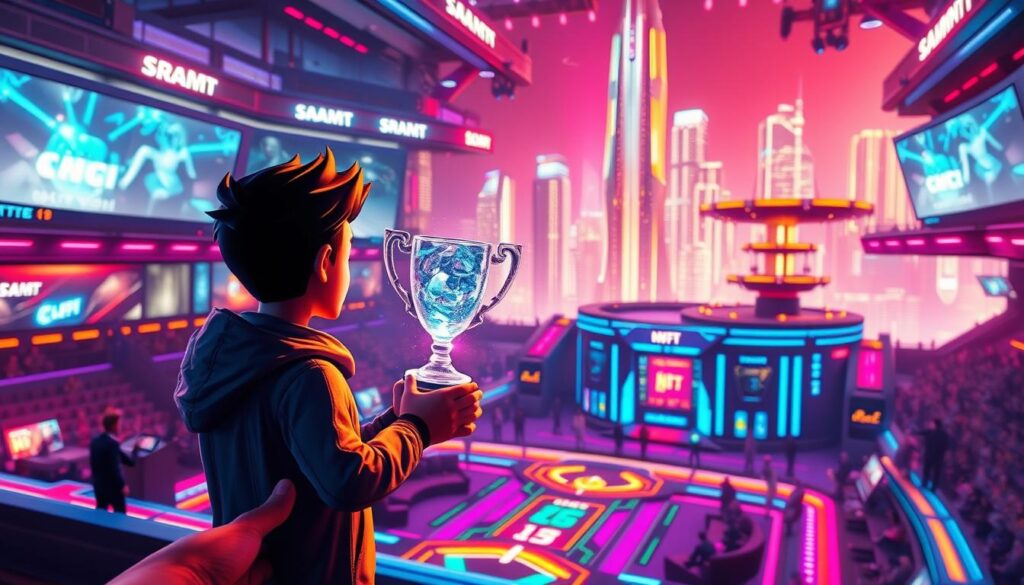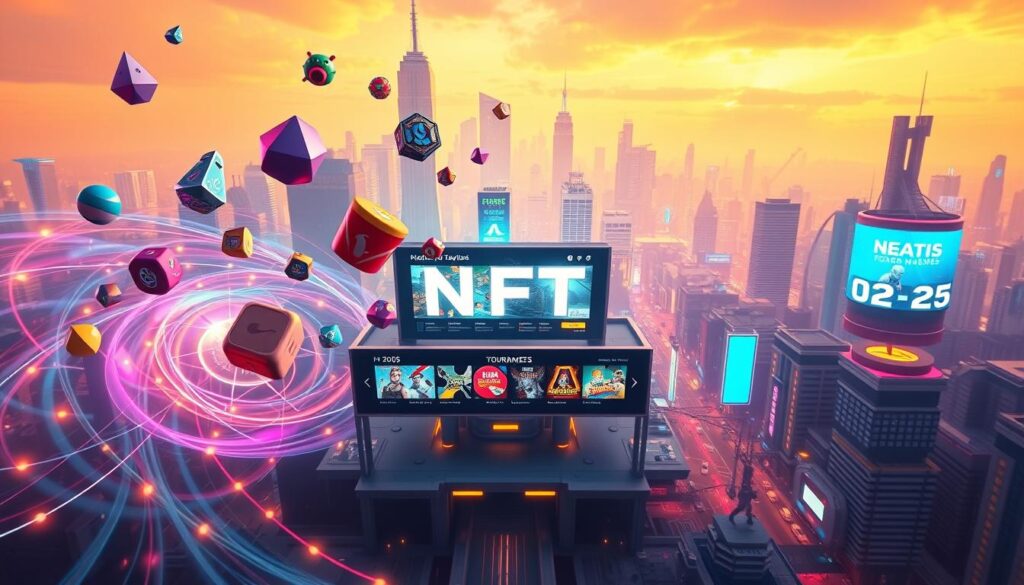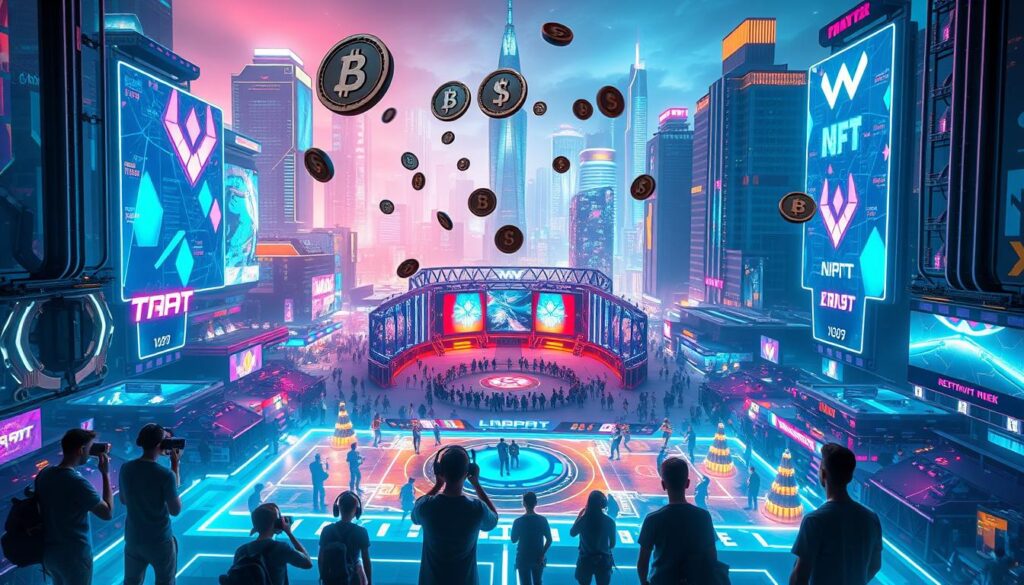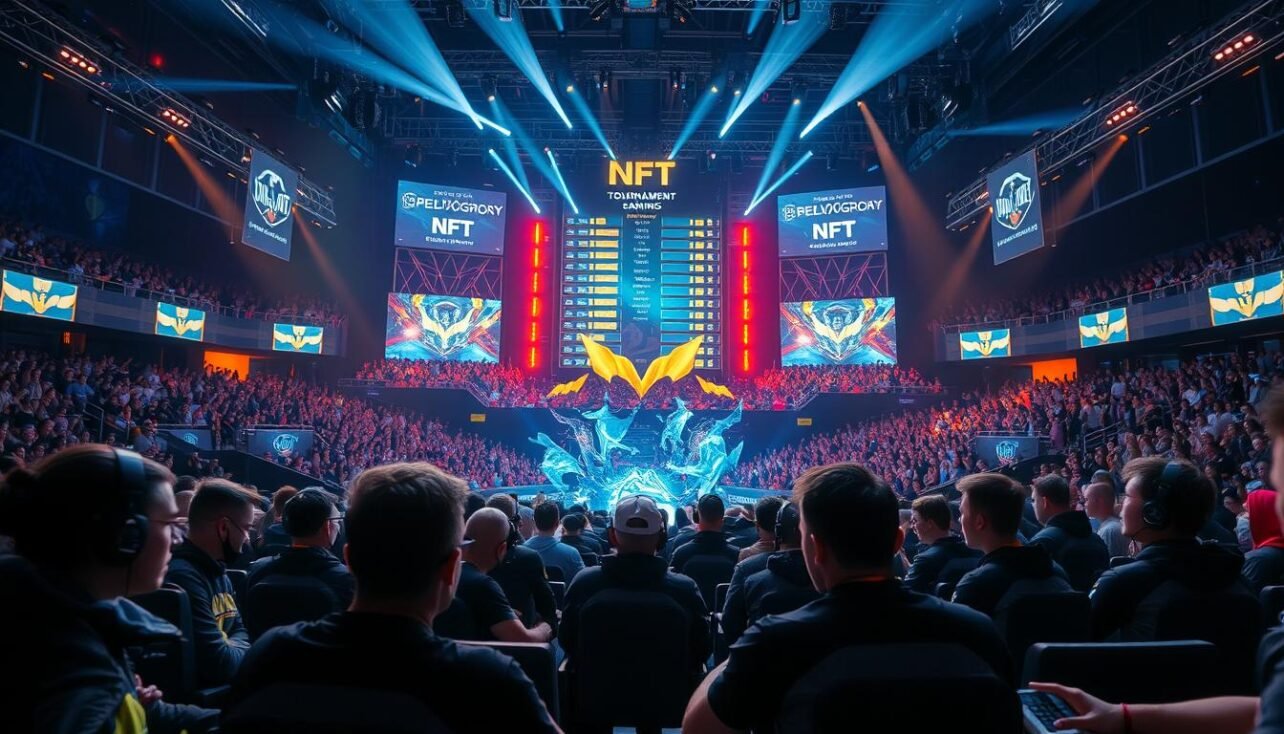The world of competitive gaming has evolved dramatically with blockchain technology. Players now have exciting opportunities to earn valuable digital assets while showcasing their skills. This new frontier combines the thrill of competition with tangible rewards.
Blockchain-based games use unique digital tokens called NFTs. These tokens represent ownership of in-game items like characters, land, or special equipment. Unlike traditional games where purchases stay within the ecosystem, these assets have real-world value.
Competitive events in this space offer genuine economic opportunities. Participants can acquire rare items that carry both gameplay advantages and market value. The system creates a direct connection between skill development and asset ownership.
For those interested in exploring this space further, our beginner’s guide to making money with NFT provides comprehensive starting points. The landscape continues to grow with platforms hosting regular competitive events across the United States.
Key Takeaways
- Blockchain technology enables true ownership of in-game digital assets
- Competitive events offer opportunities to acquire valuable items
- Earned assets can be traded or sold across different platforms
- Skill development translates directly to economic benefits
- Numerous platforms host tournaments accessible to US players
- Digital assets range from character avatars to virtual property
- The system creates real economic value from gaming achievements
Understanding the NFT Gaming Ecosystem
Modern gaming experiences now offer unprecedented control over virtual items through blockchain innovation. This technology creates new opportunities for digital property rights that were previously impossible.
What NFTs Mean for Gamers
Non-fungible tokens represent unique digital assets with verifiable scarcity. Each token has distinct attributes that affect its value and performance.
Players gain complete autonomy over their earned items. Unlike traditional systems, these assets belong to the user permanently. This creates real economic value from gaming achievements.
Rarity levels and utility within games determine asset prices. Some digital possessions appreciate significantly based on marketplace demand.
Blockchain Basics and Digital Ownership
The decentralized ledger system ensures all transactions remain secure and transparent. This technology underpins the trustworthiness of digital ownership.
Every transfer and ownership record becomes immutable on the blockchain. The system prevents duplication while establishing authenticity without centralized control.
Understanding these fundamental concepts is essential for participating in this new gaming landscape. The technology enables true portability across compatible platforms.
Benefits of NFTs in Gaming and Tournaments
Digital collectibles revolutionize how participants interact with virtual worlds by establishing genuine property rights. This fundamental shift creates numerous advantages for competitive environments and regular gameplay alike.

True Ownership and Secure Trading
Participants maintain complete control over earned digital items. They can sell, trade, or transfer assets without platform restrictions.
Blockchain technology ensures secure transactions through smart contracts. These self-executing agreements verify ownership and prevent fraud during exchanges.
The system creates transparent trading environments where item history remains accessible. This authentication process builds marketplace confidence for all users.
Enhancing the Player Experience
Asset portability allows earned rewards to function across compatible platforms. This interoperability adds lasting value to competitive achievements.
Some systems grant governance rights to digital asset holders. This participation in development decisions improves the overall game experience.
These benefits combine to create meaningful stakes in competitive events. The economic opportunities transform skill development into potential long-term investments.
How to Win Exclusive NFTs Through Gaming Tournaments
Understanding tournament dynamics is crucial for maximizing reward potential. Different competitive formats present unique opportunities for participants seeking digital collectibles.

Essential Strategies for Participation
Successful competitors focus on skill development and game mechanics mastery. Learning specific rules and scoring systems gives participants an edge.
Choosing the right events matters greatly. Consider your skill level, entry requirements, and prize pool attractiveness. This strategic selection improves winning chances significantly.
Various competitive formats include:
- Battle competitions testing combat skills
- Quest completions requiring puzzle-solving
- Racing events emphasizing speed
- Strategic challenges demanding careful planning
Leveraging In-Game Rewards and Bonuses
Power-ups and special items can provide competitive advantages during events. Smart use of these resources often determines final standings.
Reward distribution varies between platforms. Some competitions use winner-takes-all formats. Others employ tiered structures where multiple participants receive prizes.
Regular participation builds valuable experience over time. Even smaller events contribute to skill development and potential asset accumulation.
Special seasonal competitions often feature more valuable digital items. Timing your participation around these events can yield better returns for your effort.
Top Gaming NFT Platforms and Tournaments in the US
The United States market features several prominent platforms where participants can engage in skill-based competitions. These environments offer diverse experiences across various genres and styles.
Overview of Leading Platforms
Role-playing games like Axie Infinity allow players to collect and battle fantasy creatures. Collectible card game platforms such as Splinterlands and Gods Unchained host regular competitive matches.
Virtual world platforms including Decentraland and The Sandbox enable creative building and social interactions. Racing games provide officially licensed vehicle competitions with unique rewards.

Notable US-Based Tournaments and Events
Many platforms organize ongoing competitive seasons with consistent reward structures. These events allow dedicated participants to accumulate valuable digital assets over time.
Special seasonal events and collaborations often feature limited-edition items unavailable through regular gameplay. Creative contests in virtual worlds reward unique content creation with premium properties.
Casino-style platforms have integrated digital collectibles into their reward systems. This expands the competitive landscape for American players seeking diverse experiences.
Play-to-Earn Models and In-Game Reward Structures
Player compensation models have undergone a revolutionary shift with the advent of token-based economies. These systems create sustainable environments where participants receive tangible benefits for their contributions.
Tokenization and Smart Contracts
Digital assets transform into blockchain-based tokens through tokenization. This process grants players verifiable ownership of characters, items, and virtual properties.
Smart contracts automate reward distribution without manual intervention. These digital agreements execute predefined rules, ensuring fair compensation for achievements.

Balancing Free-to-Play and Play-to-Earn Options
Many platforms now offer hybrid approaches to accommodate different players. Free-to-play modes provide access without financial commitment but offer limited rewards.
Play-to-earn models generate revenue through active participation. This creates a balanced ecosystem where casual and competitive players both find value.
The economic structure supports various games and their unique reward systems. This flexibility allows each game to implement compensation models that suit its community.
Integrating Blockchain Innovations with Casino Gaming
The casino industry is embracing blockchain technology in innovative ways. This integration creates new opportunities where digital collectibles become meaningful rewards.
NFTs in Casino Rewards and Perks
Leading platforms now offer unique digital items instead of traditional bonuses. Stake.com features branded collectibles for showcase or trade. Rollbit allows participants to buy, sell, or use digital items during gameplay.
These assets serve multiple functions beyond simple ownership. BC.Game rewards loyal participants with collectible assets that grow in value. Metaspins builds community identity through digital badges tied to platform interaction.
TG Casino uses these items as status markers and collectibles. Wall Street Memes treats them as community tokens. Lucky Block grants VIP features and tournament access to holders.
Cross-Platform Gaming and Digital Asset Trading
The true power of this integration lies in cross-platform functionality. Assets earned in one environment often hold value in others. This creates exciting investment opportunities beyond single-platform use.
CoinPoker designs digital items as tournament entry requirements. Ownership itself becomes the access pass to exclusive events. This approach represents the future of casino experiences.
Blockchain technology ensures secure trading across different spaces. Participants can confidently exchange assets knowing each item’s authenticity is verified. This system enhances traditional gambling with verifiable digital ownership.
Effective Strategies for Maximizing Your Gaming Experience
The most accomplished participants understand that personal growth and social connections create lasting value. Building a comprehensive approach involves developing individual abilities while engaging with like-minded enthusiasts.
Skill Improvement and Tactic Development
Continuous learning separates casual participants from serious contenders. Studying game mechanics and analyzing top performers provides valuable insights.
Practice sessions should focus on specific weaknesses while reinforcing strengths. Understanding meta shifts and patch updates keeps strategies relevant. This adaptive approach maintains competitive advantages.
Community Engagement and Guild Benefits
Joining dedicated communities offers access to collective knowledge and shared resources. These groups provide mentorship opportunities and collaborative practice environments.
Guild membership often includes shared reward pools and sponsored events. The social aspect enhances the overall experience while opening doors to team strategies.
Diversifying participation across different platforms reduces risk while increasing opportunities. Marketplace awareness helps time asset acquisitions strategically.
Emerging Trends in NFT Gaming Tournaments
Cutting-edge technologies are creating unprecedented opportunities in the competitive digital space. The landscape continues to evolve with innovations that enhance player experiences and reward structures.
These developments signal a significant shift toward more immersive and accessible competitive environments. Participants can expect new formats and enhanced digital asset functionality.
AR Integration and Mobile Gameplay
Augmented reality brings digital items into physical spaces through smartphone cameras. This integration creates blended experiences where virtual achievements manifest in real-world contexts.
Mobile devices now support complex games with full earning potential. Players can participate in competitive events from anywhere with consistent reward structures.
Future Innovations in Digital Assets
Digital collectibles are evolving beyond static images to dynamic, interactive assets. These items may change appearance or gain new abilities based on player achievements.
Cross-platform functionality allows items to move seamlessly between different games. This interoperability increases the utility and value of earned rewards.
| Trend | Current Status | Future Potential | Player Impact |
|---|---|---|---|
| AR Integration | Early adoption phase | Full environmental blending | Enhanced immersion |
| Mobile Expansion | Rapid growth | Desktop-level experiences | Increased accessibility |
| Asset Evolution | Basic dynamic features | AI-responsive items | Personalized rewards |
| Cross-Platform Play | Limited compatibility | Universal interoperability | Portable value |
These innovations collectively create an expanding universe of opportunities for digital enthusiasts. The ecosystem continues to develop with player-centered economies gaining prominence.
Staying informed about these trends helps participants capitalize on new formats as they emerge. The digital world of competitive events promises continued evolution and exciting challenges.
Conclusion
The digital frontier of play-to-earn experiences has fundamentally reshaped player expectations and economic possibilities. Competitive events now offer tangible pathways to ownership of valuable digital items.
Whether engaging in virtual real estate competitions or strategic challenges, participants can acquire unique digital assets with real-world value. Blockchain technology ensures transparent ownership without intermediary control.
Success in this space requires combining skill development with strategic participation. Joining active communities provides valuable insights while enhancing the overall experience.
These competitive events represent more than entertainment—they’re participation in evolving digital economies. For those seeking additional ways to benefit, exploring how to earn rewards with NFT memberships offers complementary opportunities.
The landscape continues to expand with new formats and integration models. Early participants position themselves advantageously in this growing world of digital ownership.
FAQ
What are the main advantages of owning digital assets in a game?
Owning digital assets gives you true control. You can trade, sell, or use your items across different platforms. This adds real-world value to your gameplay and investment.
How do play-to-earn models create income for players?
These models reward your time and skill with tokens or unique items. By completing challenges and participating in events, you can generate revenue from your hobby.
Can I participate in these events without buying anything first?
Absolutely. Many platforms offer free-to-play options. You can start by joining community events and earning your initial rewards through gameplay.
What is the role of blockchain technology in this space?
Blockchain secures ownership of your digital assets. It uses smart contracts to make every transaction transparent and permanent, building trust within the ecosystem.
How does being part of a guild or community help?
Communities and guilds offer shared strategies, resources, and support. They provide benefits like group participation in tournaments, enhancing your overall experience.
Are these digital items a good long-term investment?
Like any investment, value can fluctuate. However, rare items from popular games can appreciate, especially when they offer utility or are part of a growing ecosystem.
What are some popular games that use this model?
Titles like Axie Infinity and The Sandbox are leaders. They integrate non-fungible tokens directly into their core gameplay and reward structures for players.


No comments yet